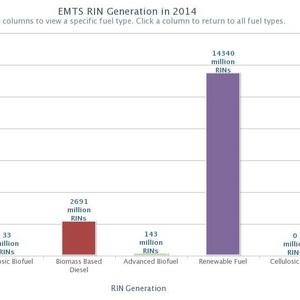EPA: 2014 cellulosic RIN generation tops 33 million

U.S. EPA
January 15, 2015
BY Erin Voegele
The U.S. EPA has released renewable identification number (RIN) generation data for December, reporting that more than 8.53 million cellulosic RINs were generated during the month. EIA data currently shows more than 33.01 million cellulosic RINs were generated in 2014.
According to the EPA, more than 8.53 million D3 cellulosic biofuel RINs were generated in December, bringing the total for 2014 to 32.96 million. That number includes 683,643 D3 RINs generated for ethanol, 44,168 generated for cellulosic renewable gasoline, 14.91 million generated for renewable compressed natural gas and 17.35 million generated for renewable liquefied natural gas. All 32.98 million D3 RINs generated last year were generated by domestic producers.
EPA data indicates no D7 cellulosic RINs were generated in December. The total for last year, however, was 54,308, including 8,859 D7 RINs generated for cellulosic diesel and 50,446 generated for cellulosic heating oil. According to the EPA, 8,859 D7 RINs were generated by domestic producers, with 50,446 generated by importers.
Advertisement
Nearly 12.47 million D5 advanced biofuel RINs were generated in December, bringing the total for last year to 142.89 million. Most, 90.3 million, were generated for ethanol, with 20.35 million generated for biogas, 17.91 million generated for naptha, 113,884 generated for heating oil, 14.3 generated for non-ester renewable diesel, and 6,344 generated for renewable compressed natural gas. Nearly 78.51 million D5 RINs were generated by domestic producers, with 64.47 generated by importers.
Nearly 1.31 billion D6 renewable fuel RINs were generated in December, bringing the total for 2014 to more than 14.33 billion. Most D6 RINs, 14 billion, were generated for ethanol, with 79.78 million generated for biodiesel, and 257.37 million generated for non-ester renewable diesel. More than 14 billion D6 RINs were generated domestically, with 79.01 million generated by importers and 257.37 generated by foreign entities.
Advertisement
More than 308.37 million D4 biomass-based diesel RINs were generated in December, bringing the total for last year to nearly 2.69 billion. The majority, 2.14 billion, were generated for biodiesel, with 555.54 million generated for non-ester renewable diesel. Nearly 2.2 billion D4 RINs were generated by domestic producers, with 203.9 generated by importers and 291.97 million generated by foreign entities.
According to EPA data, nearly 17.21 billion RINs were generated last year. Nearly 559.21 million of those RINs have been retired, with 471.51 million locked and available and 16.18 billion unlocked and available.
Related Stories
Fluid Quip Technologies: Adkins Energy to implement Overdrive system for enhanced oil yield and lower operating costs
Fluid Quip Technologies on April 24 announced that Adkins Energy will install FQT’s Overdrive Oil Pretreat System. This groundbreaking technology boosts the performance of existing distillers corn oil systems.
Green Plains Inc. on April 15 announced it is continuing the refreshment of its board of directors through appointments of three highly qualified and independent individuals: Steven Furcich, Carl Grassi, and Patrick Sweeney.
In April, the U.S. Grains Council and the National Corn Growers Association held trade policy academies in Ames, Iowa, and Birmingham, Michigan, for producers to learn about the latest developments affecting global markets for their goods.
Valero Energy Corp. released Q1 financial results on April 24, reporting that a tough margin environment negatively impacted the company’s renewable diesel operations during the three-month period. Valero’s ethanol segment was profitable.
UNICA, the Brazilian sugarcane industry association, has released final data for the 2024-’25 harvest season, reporting record high ethanol production and sales despite reduced sugarcane milling. Corn ethanol production was up significantly.
Upcoming Events










